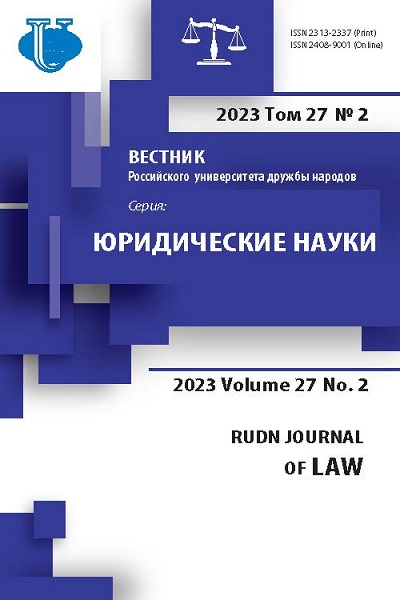Concession policy of the Soviet state: implementation mechanism
- Authors: Nemytina M.V.1, Krasnov A.B.2
-
Affiliations:
- RUDN University
- International intergovernmental organization Joint Institute for Nuclear Research (JINR)
- Issue: Vol 27, No 2 (2023)
- Pages: 321-337
- Section: STATE AND LAW IN CONTEMPORARY WORLD
- URL: https://journals.rudn.ru/law/article/view/35027
- DOI: https://doi.org/10.22363/2313-2337-2023-27-2-321-337
- EDN: https://elibrary.ru/RSCVCG
- ID: 35027
Cite item
Full Text
Abstract
The article analyzes the experience of the concession policy implementation by the RSFSR and the USSR during the 20s of the twentieth century and the approaches used in its framework, which allowed solving simultaneously a wide range of tasks related to the rise of the domestic economy and overcoming foreign policy isolation. This experience of the Soviet state can be used to solve the challenges the Russian Federation is facing today. The authors substantiate that the concession policy of the Soviet state was a rationally constructed mechanism able to solve a number of tasks. 1) Creation of foreign concessions in the Soviet country contributed to withdrawal from the diplomatic blockade declared by Western countries. 2) Through the concession policy the obligations of the Russian Empire to foreign investors were renewed in the conditions of a socialist economy. 3) By creating concessions the Soviet government headed by V.I. Lenin attracted the material and technological resources of the European countries and the USA for the development of the economy of the Soviet country. 4) At concession enterprises models of industrial relations with a high level of labor organization and living conditions of workers were formed at the expense of foreign investors, which then had to be introduced everywhere. 5) The concession policy covered the national suburbs and contributed to unification of the economic potential of the republics as part of the USSR. The analysis of the legal regulation of concession relationships carried out in this article gives reason to suppose that the concession policy of the Soviet state should not be reduced to the NEP because its implementation started earlier. In fact, it was launched with the adoption of the Decree of the Council of People’s Commissars of November 23, 1920 On General Economic and Legal Conditions for Concessions and within its framework a range of tasks that went far beyond the economic recovery envisaged by the NEP through private law principles was solved. Attention should also be paid to the constitutional nature of the regulation of concession legal relations, which was determined by the “Treaty on the USSR Foundation of 1922” and the Constitution of 1924.
About the authors
Marina V. Nemytina
RUDN University
Email: nemytina-mv@rudn.ru
ORCID iD: 0000-0002-7132-0648
SPIN-code: 5956-1160
Doctor of Legal Sciences, Full Professor оf the Department of Public Politics and History of State and Law, Law Institute, Law Institute
6 Miklukho-Maklaya str., Moscow, 117198, Russia FederationAlexey B. Krasnov
International intergovernmental organization Joint Institute for Nuclear Research (JINR)
Author for correspondence.
Email: krasnov@jinr.ru
ORCID iD: 0000-0002-3357-7338
SPIN-code: 9270-9845
Senior legal adviser, Legal department
6, Joliot-Curie str., Dubna, Moscow region, 141980, Russian FederationReferences
- Bernshtein, I.N. (1930) Essay on the concession law of the USSR. Reichel, M.O. (ed.). Moscow-Leningrad, Gosizdat Publ. (in Russian).
- Bulatov, V.V. (2011) Concession relations in the USSR: monograph. Volgograd, VolgGU Publ. (in Russian).
- Butkovsky, V.P. (1928) Foreign concessions in the national economy of the USSR. Moscow, State Publishing. (in Russian).
- Gladkov, I.A. (ed.) (1977) The History of the Socialist Economy of the USSR in seven Vols. Vol. 3. Building the foundation of the socialist economy in the USSR, 1926-1932. Moscow, Nauka Publ. (in Russian).
- Hummer, A. (1988) My century is the twentieth. Paths and meetings. Moscow, Progress Publ. (in Russian).
- Ioffe, A.A. (1927) Results and prospects of concession policy and practice of the USSR. Planovoe khozyaistvo. (1). 75-87. (in Russian).
- Kissinger, H. (1994) Diplomacy. New York, Simon & Schuster.
- Kurys’, N.V. (2003) Foreign Investments: Russian History (Legal Study). Saint Petersburg, Legal Center Press Publ. (in Russian).
- Kurys’, N.V. & Tishchenko, S.G. (2011) Concession law of the USSR: history, theory, factors of influence. Saint Petersburg, Law Center-Press Publ. (in Russian).
- Landau, B.A. (1925) Concession law of the USSR: With collection of existing laws on the procedure for granting concessions. Moscow, Pravo i zhizn' Publ. (in Russian).
- Lenin, V.I. (1970) On the tasks of the People's Commissariat of Justice in the context of the New economic policy. Letter to Kursky D.I. The Complete Works. 5th edition. Vol. 44 (June 1921 - March 1922). Moscow, Politizdat Publ. (in Russian).
- Popondopulo, V.F. (2014) PPP - concept, meaning, legal framework. In: Gritsenko, E.V. (ed.). Public-private partnership in the municipal sphere: German and Russian experience. Collective monograph. Moscow, Infotropic Media Publ. (in Russian).
- Radek, K.B. (1923) Foreign policy of Soviet Russia. Moscow, Petrograd, Gosizdat Publ. (in Russian).
- Stalin, I.V. (1947) On the unification of the Soviet Republics: Report at the X All-Russian Congress of Soviets December 26, 1922. Essays. Vol. 5. Moscow, OGIZ Publ. (in Russian).
- Sutton, A.C. (1970) Western Technology and Soviet Economic Development 1917 to 1930. Stanford (California, USA): Stanford University. 381 p.
- Veeder, V.V. (2005) Soviet-American arbitration process of Harriman: Lloyd George, Lenin and cannibals. International Соmmercial Arbitration Review. 2(6), 92-108. (in Russian).
- Veeder, V.V. (2009) Chancellor Wirth and the Mologoles Concession» 1923-1927: the German-speaking Origins of the ICSID Convention. In: Christina Binder et al. (eds.). International Investment Law for the 21st Century: Essays in Honour of Christoph Schreuer. Oxford, Oxford Academic. Pp. 377-400. Doi: https://doi.org/10.1093/acprof:oso/9780199571345.003.0021
- Winkler, G.A. (2013) Weimar, 1918-1933: The History of the first German Democracy. Moscow, ROSSPAN Publ. (in Russian).
- Zlatopol’skii, D.L. & Chistyakov, O.I. (1972) Formation of the USSR. Moscow, Yuridicheskaya literatura Publ. (in Russian).
Supplementary files















